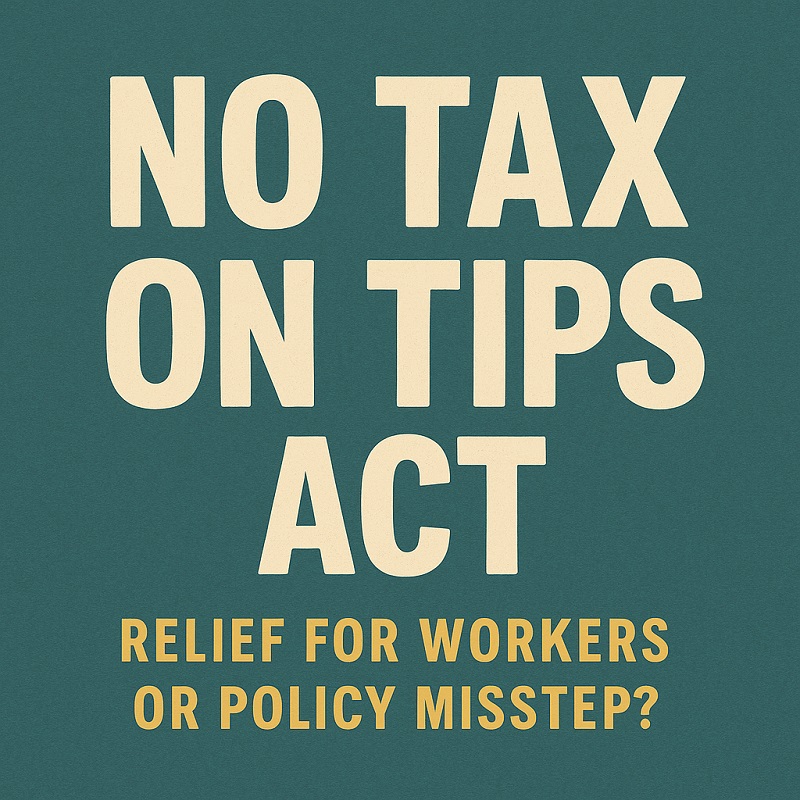No Tax on Tips Act is a federal tax reform bill that allows up to $25,000 in cash tips to be exempt from federal income tax. It aims to boost earnings for tipped workers but raises equity and sustainability concerns.
May 20, 2025 the U.S. Senate passed the No Tax on Tips Act (S.129) a bipartisan bill that exempts up to $25,000 in cash tips from federal income tax for workers in traditionally tipped occupations. Now the House is considering its counterpart (H.R.482) and President Trump is expected to sign it into law. The No Tax on Tips Act has millions of service workers hopeful. But as we celebrate the relief for bartenders, servers and delivery drivers we must ask: does this legislation address the deeper structural issues in our economy and how does it align with the urgent need for environmental and social sustainability? At TheEnvironmentalBlog.org we’re looking at the No Tax on Tips Act through the lens of equity and ecological impact, is it a transformative policy or a temporary fix.
How the No Tax on Tips Act Helps Tipped Workers
The No Tax on Tips Act targets workers in industries where tips supplement often low wages like hospitality, beauty services and delivery. By allowing a 100% federal income tax deduction on reported cash tips (including cash, card payments and checks) up to $25,000 annually for workers earning less than $160,000 a year the bill could put an extra $1,260 in the pockets of the average tipped worker according to Congressional Budget Office estimates. For a server in Las Vegas or a nail technician in Miami this could mean covering utility bills or investing in energy efficient appliances aligning with environmental goals of reducing household energy use.
This focus on tipped workers resonates with environmental justice principles. Many service workers come from communities of color disproportionately affected by climate driven challenges like heatwaves that strain urban infrastructure or rising housing costs in flood prone areas. By increasing disposable income the No Tax on Tips Act could enhance financial resilience enabling workers to afford sustainable choices like public transit or eco-friendly products. But the bill’s benefits are not universal and its limitations need to be examined.
Downsides of the No Tax on Tips Act: Equity & Waste
Despite its charm the No Tax on Tips Act is a band aid on a broken system. The federal tipped minimum wage has been stuck at $2.13 an hour in many states for years and forces workers to rely on tips which perpetuates a cycle of financial instability. This reliance can drive overconsumption in service industries as businesses prioritize high turnover models to maximize tips leading to resource intensive practices like food waste in restaurants or fuel heavy delivery operations. In 2023 the US restaurant industry generated an estimated 11.4 million tons of food waste which ends up in landfills and produces methane. The No Tax on Tips Act does nothing to incentivize sustainable practices in these sectors missing an opportunity to align economic relief with environmental progress.
Furthermore the bill creates inequities between tipped and non-tipped workers. A retail cashier making $30,000 a year faces the same economic pressures as a server but gets no tax relief under the No Tax on Tips Act. This could deepen the divisions among low wage workers many of whom face environmental injustices like air pollution from long commutes or lack of access to green spaces. The bill’s cost $10-$15 billion a year potentially $120 billion over 10 years could also strain federal budgets and divert funds from programs like renewable energy subsidies or climate adaptation initiatives.
Nevada Case Study: No Tax on Tips Meets Resource Use
Nevada where over 5% of the workforce tips offers a window into the No Tax on Tips Act’s impact. In Las Vegas servers and bartenders make $40,000-$60,000 a year with tips making up to 60% of their income. The bill could save them thousands in taxes and pump more money into the local economy as they spend on goods and services. But Nevada’s service industry is resource intensive with casinos and restaurants consuming massive amounts of energy and water in a region already stressed by climate change. Without incentives for sustainability the No Tax on Tips Act may inadvertently fuel consumption patterns that exacerbate environmental stress like increased demand for single use plastics in takeout orders. A 2024 study by the Nevada Resort Association found that Las Vegas restaurants generate 20% more waste per capita than the national average. The No Tax on Tips Act with tax credits for green practices like composting or energy efficient appliances could help mitigate that while supporting workers. Nevada is a case study for why we need to think holistically and balance economic relief with environmental responsibility.
Environmental Impact of the No Tax on Tips Act
The No Tax on Tips Act operates in a bubble, ignoring the environmental footprint of tipped industries. Delivery services contribute to urban emissions, with food delivery drivers logging 1.4 billion miles annually in the U.S., per a 2024 Rideshare Report. Restaurants use single-use plastics and energy-intensive operations. By boosting workers’ pay without addressing these impacts, the bill will fuel consumption. Coupling the tax break with incentives for electric delivery vehicles or waste reduction programs could align the No Tax on Tips Act with climate goals. State-level policies matter too, as states like California may still tax tips, and some proposed bills could cut unemployment benefits by excluding tips from wage calculations.
Tipped vs. Non-Tipped Workers: A Visual Comparison
To show the No Tax on Tips Act’s unfairness, look at the difference between tipped and non-tipped workers. The chart below compares a server (tipped) and a retail cashier (non-tipped), both making $40,000 a year, across income sources, tax benefits under the bill and environmental exposures due to their work conditions. Servers get tips for up to 60% of their income, while cashiers get none, and face similar economic and environmental challenges like commuting in polluted cities or living in climate vulnerable neighborhoods. The No Tax on Tips Act gives servers a tax deduction on tips, potentially saving them $1,500-$2,000 a year, while cashiers get nothing, making it even more unfair.
This visual shows a big problem: the No Tax on Tips Act favors one group of low-wage workers over another, despite both facing economic and environmental stressors. Both groups need policies that address their financial and ecological challenges, like wage increases or green job training programs.
Who Wins and Who’s Left Out?
About 2.5% of the U.S. workforce—4 million workers—are in tipped occupations, with 37% making so little they already owe no federal income tax. For these workers the No Tax on Tips Act doesn’t offer much, as their tax liability is already low. Higher earning tipped workers ($50,000-$100,000) will gain the most, with the top 20% getting 40% of the benefits, according to the Center for American Progress. The shift to cashless transactions—84% of restaurant payments in 2024—complicates the bill’s impact as its definition of “cash tips” is unclear for digital tips via Venmo or PayPal, potentially excluding gig workers. Excluding tips from taxable income may also disqualify workers from benefits like the Earned Income Tax Credit, which low-income workers rely on to live sustainably.
Could the No Tax on Tips Act Go Further?
While this act provides immediate relief, experts say combining it with green tax credits and wage reforms could make it more powerful. For example, a joint policy initiative that includes a higher federal tipped wage and tax rebates for sustainable workplace practices could balance worker benefits with environmental responsibility.
A Holistic Reform
The No Tax on Tips Act is a good idea, but it’s not transformative. At TheEnvironmentalBlog.org we advocate for policies that combine economic justice with environmental sustainability. Lawmakers should consider:
- Raise the Tipped Minimum Wage: A living wage reduces tips, stabilizes incomes and reduces turnover which reduces waste.
- Green Incentives for Service Industries: Tax credits for restaurants and delivery services that adopt sustainable practices – like composting, reusable packaging or electric fleets – would align economic relief with environmental goals.
- Equitable Tax Policies: Tax relief for all low-wage workers would be fair and support communities facing environmental injustices.
- Digital Tip Clarity: Update the bill to include digital tips so gig workers benefit, reflecting the modern economy.
Looking Ahead
As the House debates the No Tax on Tips Act we must weigh the benefits against the limitations. It gives immediate relief to tipped workers but risks locking in an outdated wage system and diverting resources from climate resilience. At TheEnvironmentalBlog.org we believe true progress is in policies that lift up workers and a sustainable future. The No Tax on Tips Act is a start but it’s not the finish line.
What do you think about the No Tax on Tips Act? Comment below or join the conversation on X at #NoTaxOnTipsAct.




